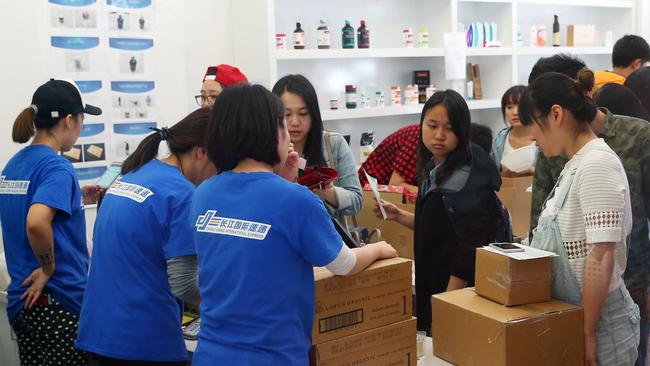China lifts e-commerce import limits
Listed firms with exposure to China could benefit from Beijing’s shake-up of crossborder online ordering rules.

Australian companies such as Treasury Wine Estates, Blackmores and A2 Milk could benefit from new moves in China to boost the e-commerce market announced last week.
China’s Ministry of Finance announced last week that it will lift the annual duty free limit for individuals buying goods overseas by 30 per cent to 26,000 yuan, around $5078.
It is also adding to the list of products which can be imported into China duty free on cross border e-commerce platforms — goods including sparkling wine, beer made from malt, fitness equipment and condoms.
The higher caps, which will come into effect from January, along with other major changes to e-commerce regulations, are set to further boost the potential for sales into China of high-quality foreign consumer goods.
Figures from China’s Ministry of Commerce show retail imports into China on e-commerce platforms rose by 54 per cent to a record 67.2 billion yuan ($13.1bn) for the first 10 months of this year.
The ministry said it would be more than doubling the cap on individual duty free transactions from 2000 to 5000 yuan and signalled it could increase the total annual cap in future in line with rising incomes.
The higher import ceiling will be good for the daigou market in Australia, where personal shoppers sell a range of consumer products to their friends and family in China, and for Australian companies selling their products directly into China on e-commerce platforms such as Alibaba’s TMall Global.
But it comes at a time when the Chinese government is also tightening e-commerce regulations from next year with stricter requirements on labelling, formalisation of import channels, reporting requirements and moves to increase liability on exporters and e-commerce channels to prevent fraud and fake products.
Australian companies selling through e-commerce channels in China have been closely watching the impact of the new regulations and clarifications being announced in recent weeks as the Chinese government seeks to have more regulatory control over the rapidly growing e-commerce import sector.
A2 Milk chief executive Jayne Hrdlicka said the company welcomed the latest round of guidance on how the new e-commerce laws will work when they come into effect next year.
Foreign companies have been given a grace period until the end of March to comply with the changes.
Ms Hrdlicka said the latest round of statements issued last week provided further clarity on issues such as defining the major participants within the cross border e-commerce channel and their responsibilities.
She said English label products which complied with their country of origin regulations would still be able to be sold through cross-border e-commerce channels provided that the Chinese consumers had access to an electronic Chinese translation of the packaging label.
Other requirements include the need for adequate product traceability systems, return and exchange systems, product recall systems and consumer dispute handling processes.
They also include real time reporting of transaction, payment and to Chinese customs.
The higher duty free cap announcement made last week follows comments by China’s President Xi Jinping at the Shanghai Import Expo last month that China would be taking measures to boost its e-commerce business including cross-border e-commerce sales.
China sees the moves as opening the local market for more high quality foreign products and encouraging Chinese companies to upgrade their production by exposing them to competition.
A spokeswoman for Treasury Wine Estates, one of the largest foreign suppliers of wine to the China market, said the company did not want to comment on the latest Ministry of Finance announcements.
While the higher caps will help boost the total e-commerce market in China for foreign goods, the tighter regulations being introduced will put pressure on Australian companies to comply.
Concerns about the extent of the new changes saw the Chinese government announce last month that it would delay the implementation of some parts of the new laws by three months to give exporters more time to comply.
Export-oriented shares on the Australian stockmarket surged yesterday.
A2 Milk jumped 5.3 per cent to $10.3, Blackmores rose 3.2 per cent to $127.95 and Bellamy’s surged 12.02 per cent to $8.20.
Treasury Wine Estates, one of the largest foreign suppliers of wine to the China market, swelled 3.6 per cent to $14.66.




